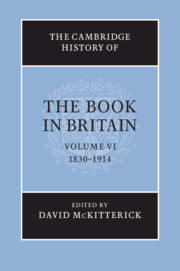Book contents
- Frontmatter
- Introduction
- 1 Changes in the look of the book
- 2 The illustration revolution
- 3 The serial revolution
- 4 Authorship
- 5 Copyright
- 6 Distribution
- 7 Reading
- 8 Mass markets: religion
- 9 Mass markets: education
- 10 Mass markets: children’s books
- 11 Mass markets: literature
- 12 Science, technology and mathematics
- 13 Publishing for leisure
- 14 Publishing for trades and professions
- 15 Organising knowledge in print
- 16 The information revolution
- 17 A place in the world
- 18 Second-hand and old books
- 19 A year of publishing: 1891
- 20 Following up The reading nation
- Bibliography
- Index
- Plate Sections
- References
15 - Organising knowledge in print
Published online by Cambridge University Press: 28 March 2010
- Frontmatter
- Introduction
- 1 Changes in the look of the book
- 2 The illustration revolution
- 3 The serial revolution
- 4 Authorship
- 5 Copyright
- 6 Distribution
- 7 Reading
- 8 Mass markets: religion
- 9 Mass markets: education
- 10 Mass markets: children’s books
- 11 Mass markets: literature
- 12 Science, technology and mathematics
- 13 Publishing for leisure
- 14 Publishing for trades and professions
- 15 Organising knowledge in print
- 16 The information revolution
- 17 A place in the world
- 18 Second-hand and old books
- 19 A year of publishing: 1891
- 20 Following up The reading nation
- Bibliography
- Index
- Plate Sections
- References
Summary
Knowledge is power. ‘Knowledge of the electric telegraph saves time; knowledge of writing saves human speech and locomotion; knowledge of domestic economy saves income; knowledge of sanitary laws saves health and life; knowledge of the laws of the intellect saves wear and tear of brain; and knowledge of the laws of the Spirit – what does it not save?’
Sir John Lubbock, who repeated a much misquoted and misunderstood aphorism before quoting Charles Kingsley’s particularisation of it, was among the most widely read pundits of the late nineteenth century. Trained as a banker, with informed interests in medical sciences, an active and reforming Member of Parliament, Fellow of the Royal Society, Principal of the London Working- Men’s College, President of the London Chamber of Commerce and with dozens of other appointments besides, he became perhaps most widely celebrated for his choice of a hundred best books in 1887. By then he had become a public sage. The book in which this paragraph appears was published by Macmillan in 1894. By 1899 it had been reprinted seven times, and was past its forty-eight thousandth copy. For another pundit, Herbert Spencer (also quoted by Lubbock), the all-important knowledge was science – the means to self-preservation, the maintenance of life and health, and the gaining of a livelihood. Amidst much else besides, science was also the means to the interpretation of national life and to the enjoyment of art. For both men, as for most people in Britain, knowledge was embedded in print, and preserved by its use.
Keywords
- Type
- Chapter
- Information
- The Cambridge History of the Book in Britain , pp. 531 - 566Publisher: Cambridge University PressPrint publication year: 2009
References
- 1
- Cited by

